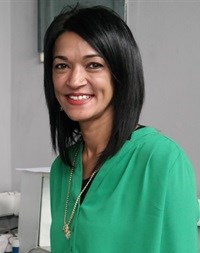PFE International sold its investment in SAFYR, leading the Zarrebinis to open PFE Extrusion. Now Nadar is the factory manager and handles procurement for yarn and fibre manufacturing, manages the payroll and oversees human resources.

It's not about breaking the glass ceiling; it's about building your own house. Many women internalise societal stereotypes and these create a psychological glass ceiling. I think the question to ask is "does a glass ceiling exist for women in any industry?" More and more women are ambitiously going into male-dominated environments, becoming entrepreneurs in their own rights, and confidently taking on roles that were previously dominated by males. I would definitely say that more women are breaking through these proverbial "glass ceilings". It's all a mindset.
My late dad was my biggest influence. He started off working in a shoe factory at a tender age of 15, as a sweeper/cleaner. He slowly moved up the ranks, becoming the floor manager after 20 years and altogether served this company for 50 years. What a great influence he was! His vocabulary was impeccable. His favourite or wise words were "always put your brain into gear before you accelerate your mouth". This, I live by. He was also such a great role model, always smartly presented. Nothing was too difficult to fix or build. He would say, "If you don't have the money, don't buy it."
The past 20 years of democracy in South Africa have seen significant strides being made to ensure that gender equality has become a societal reality. Women consider themselves to be less qualified for leadership positions. This lesser sense of entitlement discourages them from engaging in assertive, self-promoting behaviours and from taking risks, which are key leadership traits. Assertive and authoritative behaviours that people link with leadership tend not to be viewed as typical or attractive in women. What is deemed assertive in a man appears abrasive in a woman. Thus, women face trade-offs between competence and likeability.
I think, in the manufacturing industry, woman are particularly intimidated. Sometimes intimidation doesn't only come from the opposite sex. Further, some women in leadership develop what is often referred to as a 'queen bee syndrome.' They consider their title and status a culmination of a self-struggle and, therefore, do not support their female juniors' ascent to leadership.
Most definitely! Because every time we liberate a woman, we liberate a man. Acknowledging feminism isn't about making us women stronger, it's about changing the way the world perceives this strength.
Being misunderstood! Being looked at as being incapable. I stayed true to my course and faced those challenges head on. When sleeping women wake, mountains move. When suppliers come into the plant and ask to speak to the factory manager and I say "can I help you", they yet again say: "can I see the factory manager". That for me is demeaning immediately. Being the only women in meetings at times and being ignored until you make a statement or comment that impresses them and they then think... oh, she actually has a brain and can make a valuable contribution to this conversation or project.
There are three things in life that, once gone, never come back; time, words, and opportunity. Seize opportunities as there are not many in this field. Set goals, aim high and follow through with them. Have a positive outlook. Teamwork; pick the right talent and reward them.
It is a day when women are recognised for their achievements without regard for divisions, whether national, ethnic, linguistic, cultural, economic or political. Women need to be acknowledged for both their roles as caregivers on the domestic front and achievers at the office.
Lean in harder ladies! Success is the ability to go from failure to failure without losing your enthusiasm. Don't be intimidated by people or their overpowering actions. Stay true to your course and continue to empower yourself with knowledge. Stay passionate about what you believe in. Never underestimate your intelligence. Have a vision, a plan, a mentor, and be a mentor to others. Nothing or no task is too menial for you to complete. Do complete it with finesse!
Melanie Nadar completed her four-year National Diploma in Public Relations and Communications, Honours in Communications. She joined the textile industry in 1996 as the liaison officer for a Singaporean company called Lotus 2000/Prilla 2000. Thereafter, she became the group liaison officer heading the communications and public relations department. She continued her service with the company when it went into financial difficulties and was taken over by the Zarrebinis. She then moved into a position as assistant to the CEO, Dr M. Zarrebini of PFE International. Currently, she is the plant/factory manager at PFE Extrusion.
